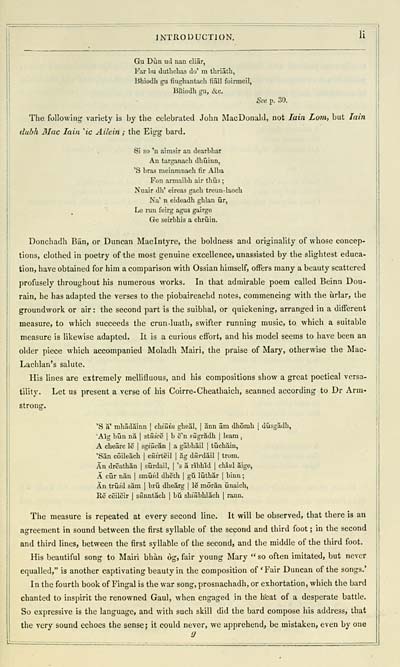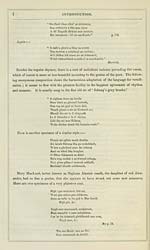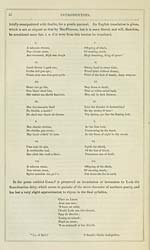Download files
Complete book:
Individual page:
Thumbnail gallery: Grid view | List view

INTRODUCTION.
Gu Dim ud nan cliar,
Far bu duthchas do' m thriath,
Bhiodh gu fiughantach fia.ll fuirmeil,
BModh gu, &c.
See p. 30.
Tlie following variety is by the celebrated John MacDonald, not Iain Lorn, but Iain
dubh Mac Iain 'ic Ailein ; the Eigg bard.
Si so 'n aimsir an dearbhar
An targanacli dhuinn,
'S bras meinmnach fir Alba
Fon armaibh air thus ;
Nuair dh' eireas gach treun-laoch
Na' n eideadh ghlan ur,
Lo run feirg agus gairge
Ge seirbhis a chruin.
Donchadh Ban, or Duncan Maclntyre, the boldness and originality of whose concep-
tions, clothed in poetry of the most genuine excellence, unassisted by the slightest educa-
tion, have obtained for him a comparison with Ossian himself, offers many a beauty scattered
profusely throughout his numerous works. In that admirable poem called Beinn Dou-
rain, he has adapted the verses to the piobaireachd notes, commencing with the urlar, the
groundwork or air : the second part is the suibhal, or quickening, arranged in a different
measure, to which succeeds the crun-luath, swifter running music, to which a suitable
measure is likewise adapted. It is a curious effort, and his model seems to have been an
older piece which accompanied Moladh Mairi, the praise of Mary, otherwise the Mac-
Lachlan's salute.
His lines are extremely mellifluous, and his compositions show a great poetical versa-
tility. Let us present a verse of his Coirre-Cheathaich, scanned according to Dr Arm-
strong.
'S à' mhàdainn | chiuin gheal, | iinn am dhomh | dusgadh,
'AIg bun na | stiuce | b en sùgràdh | leam ,
A cheàrc le | sgifican [ a gabhàil | tuchain,
'San coileach | cùirtèil | Sg dit?-dail | trom.
An dreathan | sùrdail, | 'a a ribhld | chlul àige,
A ciir nan | smmd dheth [ gu lùthàr | binn ;
An triiid sam | bru dheiirg | le moran unaich,
Re cèileir | sùnntach | bù sbiitbhlach | rann.
The measure is repeated at every second line. It will be observed, that there is an
agreement in sound between the first syllable of the second and third foot ; in the second
and third lines, between the first syllable of the second, and the middle of the third foot.
His beautiful song to Mairi bhàn òg, fair young Mary " so often imitated, but never
equalled," is another captivating beauty in the composition of 'Fair Duncan of the songs.'
In the fourth book of Fingal is the war song, prosnachadh, or exhortation, which the bard
chanted to inspirit the renowned Gaul, when engaged in the h'eat of a desperate battle.
So expressive is the language, and with such skill did the bard compose his address, that
the very sound echoes the sense; it could never, we apprehend, be mistaken, even by one
Gu Dim ud nan cliar,
Far bu duthchas do' m thriath,
Bhiodh gu fiughantach fia.ll fuirmeil,
BModh gu, &c.
See p. 30.
Tlie following variety is by the celebrated John MacDonald, not Iain Lorn, but Iain
dubh Mac Iain 'ic Ailein ; the Eigg bard.
Si so 'n aimsir an dearbhar
An targanacli dhuinn,
'S bras meinmnach fir Alba
Fon armaibh air thus ;
Nuair dh' eireas gach treun-laoch
Na' n eideadh ghlan ur,
Lo run feirg agus gairge
Ge seirbhis a chruin.
Donchadh Ban, or Duncan Maclntyre, the boldness and originality of whose concep-
tions, clothed in poetry of the most genuine excellence, unassisted by the slightest educa-
tion, have obtained for him a comparison with Ossian himself, offers many a beauty scattered
profusely throughout his numerous works. In that admirable poem called Beinn Dou-
rain, he has adapted the verses to the piobaireachd notes, commencing with the urlar, the
groundwork or air : the second part is the suibhal, or quickening, arranged in a different
measure, to which succeeds the crun-luath, swifter running music, to which a suitable
measure is likewise adapted. It is a curious effort, and his model seems to have been an
older piece which accompanied Moladh Mairi, the praise of Mary, otherwise the Mac-
Lachlan's salute.
His lines are extremely mellifluous, and his compositions show a great poetical versa-
tility. Let us present a verse of his Coirre-Cheathaich, scanned according to Dr Arm-
strong.
'S à' mhàdainn | chiuin gheal, | iinn am dhomh | dusgadh,
'AIg bun na | stiuce | b en sùgràdh | leam ,
A cheàrc le | sgifican [ a gabhàil | tuchain,
'San coileach | cùirtèil | Sg dit?-dail | trom.
An dreathan | sùrdail, | 'a a ribhld | chlul àige,
A ciir nan | smmd dheth [ gu lùthàr | binn ;
An triiid sam | bru dheiirg | le moran unaich,
Re cèileir | sùnntach | bù sbiitbhlach | rann.
The measure is repeated at every second line. It will be observed, that there is an
agreement in sound between the first syllable of the second and third foot ; in the second
and third lines, between the first syllable of the second, and the middle of the third foot.
His beautiful song to Mairi bhàn òg, fair young Mary " so often imitated, but never
equalled," is another captivating beauty in the composition of 'Fair Duncan of the songs.'
In the fourth book of Fingal is the war song, prosnachadh, or exhortation, which the bard
chanted to inspirit the renowned Gaul, when engaged in the h'eat of a desperate battle.
So expressive is the language, and with such skill did the bard compose his address, that
the very sound echoes the sense; it could never, we apprehend, be mistaken, even by one
Set display mode to: Large image | Transcription
Images and transcriptions on this page, including medium image downloads, may be used under the Creative Commons Attribution 4.0 International Licence unless otherwise stated. ![]()
| Early Gaelic Book Collections > J. F. Campbell Collection > Sar-obair nam bard gaelach, or, The beauties of Gaelic poetry > (67) |
|---|
| Permanent URL | https://digital.nls.uk/81880898 |
|---|
| Description | Volumes from a collection of 610 books rich in Highland folklore, Ossianic literature and other Celtic subjects. Many of the books annotated by John Francis Campbell of Islay, who assembled the collection. |
|---|
| Description | Selected items from five 'Special and Named Printed Collections'. Includes books in Gaelic and other Celtic languages, works about the Gaels, their languages, literature, culture and history. |
|---|

